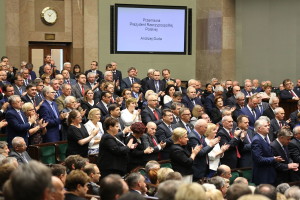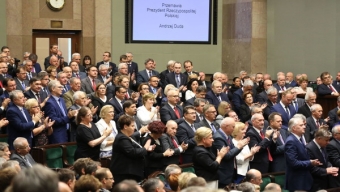As much as the Law and Justice (Prawo i Sprawiedliwosc, or PiS for short) takeover in Poland is being lamented in the German and Europhile media across Europe, with even our own Financial Times and The Economist publishing highly subjective, poorly researched and alarmist pieces, I cannot but sense that this European Conservatives and Reformists (ECR) Group partner of the Conservatives might just be able to throw a lifeline for David Cameron’s EU renegotiation prospects that he so desperately needs this year.
The renegotiation is centred on four main points set out in David Cameron’s letter to Donald Tusk. The demand for a greater „competitiveness” across the union will clearly not be a sticking point for anyone. Also, the British opt-out from the „ever closer union” has been so engrained in the Europeans’ minds since Margaret Thatcher’s days that it practically goes without saying on the continent. Ensuring we are not disadvantaged by staying out of the Eurozone, e.g. by safeguarding no UK obligation for euro countries’ bailouts, may be more difficult to secure but still achievable as it ultimately boils down to the basic principles of fairness and responsibility.
 The point universally believed to be toughest to secure is to do with constricting the new EU migrants’ access to benefits for their initial four years in the United Kingdom, which is perceived by some as discriminatory and used for political point-scoring in the countries whose citizens are most likely to be affected by such changes. It is also universally recognized that all EU citizens would be subject to the same laws and rules, but such restrictions in countries clearly overwhelmed by the influx should definitely be considered… especially if they were to be given a blessing from the countries of the immigrants’ origin. In any case, the newcomers’ rights to benefits should not be hard to forego given the Eastern EU immigrants are by far and away here for work, which is duly reflected by the proportionately high employment rate.
The point universally believed to be toughest to secure is to do with constricting the new EU migrants’ access to benefits for their initial four years in the United Kingdom, which is perceived by some as discriminatory and used for political point-scoring in the countries whose citizens are most likely to be affected by such changes. It is also universally recognized that all EU citizens would be subject to the same laws and rules, but such restrictions in countries clearly overwhelmed by the influx should definitely be considered… especially if they were to be given a blessing from the countries of the immigrants’ origin. In any case, the newcomers’ rights to benefits should not be hard to forego given the Eastern EU immigrants are by far and away here for work, which is duly reflected by the proportionately high employment rate.
In case of Poles, the 2011 census highlights this minority as having had the highest employment rate in Britain. As reported by the Daily Express in January 2015, only 14,800 Poles claimed Jobseekers Allowance, which amounts to less than 1.5% of the Polish population under the assumption that one million Polish nationals live in the United Kingdom. There of course is a further curious case of the in-work benefits claimed. However, no meaningful statistics are available to assess the take up within the Polish minority. Nevertheless, given the bulk of Polish migrants would have already arrived in the United Kingdom a good few years ago, not many are likely to be affected by any future restrictions for new residents – a fact Poland should be well aware of ahead of the renegotiations.
And that is where the Law and Justice might lend its support. After all, the current Polish Government’s goal is to rebuild a Poland where Poles would be able to and, more importantly, would want to live. It is also safe to assume that with its pro-family course coupled with a likely fiscal loosening, PiS will have no other options but to try and retain as many Poles as possible in Poland to ensure inflows into the budget remain secured well into the future. That would contrast with the last two Polish governments formed by the Civic Platform which happily exported what they perceived as short term unemployment, without much consideration for the disintegration of families and rapid ageing of population that was causing. For these reasons PiS may be more inclined to agree to measures discouraging ever more waves of Poles from coming to the United Kingdom in an attempt to retain more young people in Poland, without foregoing the free movement principle that is key to the EU.
Changing the treaties would require all the member countries’ agreement. Until recently, David Cameron was spending a disproportionate amount of his time with Angela Merkel. Much of that has arguably been wasted, as not only has there been no „ja” in response to his proposals so far, but little effort has been made with the many other EU members who also need consulting. Such appeasement of Germany’s growing power and appetite may have only boosted Angela Merkel’s already massively inflated ego. But the fact is that the United Kingdom, by virtue of being outside of the dreadful Eurozone, has its natural partners on the Eastern flank of the European Union and not in Berlin. Here is another level on which Poland could come in useful, given the Law and Justice drive to rebuild the Visegrad Group of Poland, Czech Republic, Slovakia and Hungary. Once Poland is on board with the re-worked British proposals, it could facilitate negotiations with the three smaller countries in the region, most of whom see the freedom of movement and equal treatment of all EU citizens as a key EU right.
So let’s not succumb to the Europhile propaganda which has been extremely unfair to the new Polish PiS government. After all, the victorious party has sat in the same ECR Group in the European Parliament as the Conservatives since 2009, with both parties providing by far the largest contingents of MEPs, hence jointly shaping the group’s strategy. The current ECR Chairman Syed Kamall MEP has spoken fondly of his former Europarliamentarian colleague and current Polish President Andrzej Duda. There are many more MEPs within these two parties who will have established excellent working relationships or even friendships, which could be leveraged in renegotiations. Also, with respect to the international policy, both the Conservatives and PiS are Atlanticist, hence it would also be in Polish government’s interests to have a friendly relationship with London, which contrasts with the more Brussels/Berlin-centric Civic Platform that shaped the last eight years of the Polish foreign policy until late October.
I still believe that, given the necessary buy-in from all the EU members is a prerequisite to the necessary treaty changes, the renegotiation looks like a very lengthy, if at all possible, process. Despite my doubts, the newest message from Donald Tusk is that two, if not three, of David Cameron’s proposals are already agreed amongst the EU members, which could just make this former Polish PM and member of the outgoing Civic Platform the dealmaker of the year (should it materialise!). The change at Poland’s helm might just get David Cameron that little bit closer to getting over the hurdle posed by the seemingly most difficult renegotiation demand. Given the numbers of Polish citizens as a proportion of all EU migrants in the United Kingdom, Poland giving her backing to this particular demand, albeit in what will most likely take a less severe form than the current proposal, may in turn sway the opinion not only within the region but possibly across the European Union.
Przemek de Skuba Skwirczynski
Media Representative of the Polish Conservatives and formerly committee member of the historic Conservative Friends of Poland










![Czy to możliwe? Laxton Hall po raz szesnasty! [ZDJĘCIA]](https://www.tydzien.co.uk/wp-content/themes/LondonLive/thumb.php?src=/media/2024/06/Głowne-zdjęcie-do-artykułu-nr-3-600x400.jpg&w=95&h=74&zc=1&q=100)




Grzegorz Krusz
Swietny komentarz, czy przeczytaja ten artykul jacys polscy lub brytyjscy politycy?